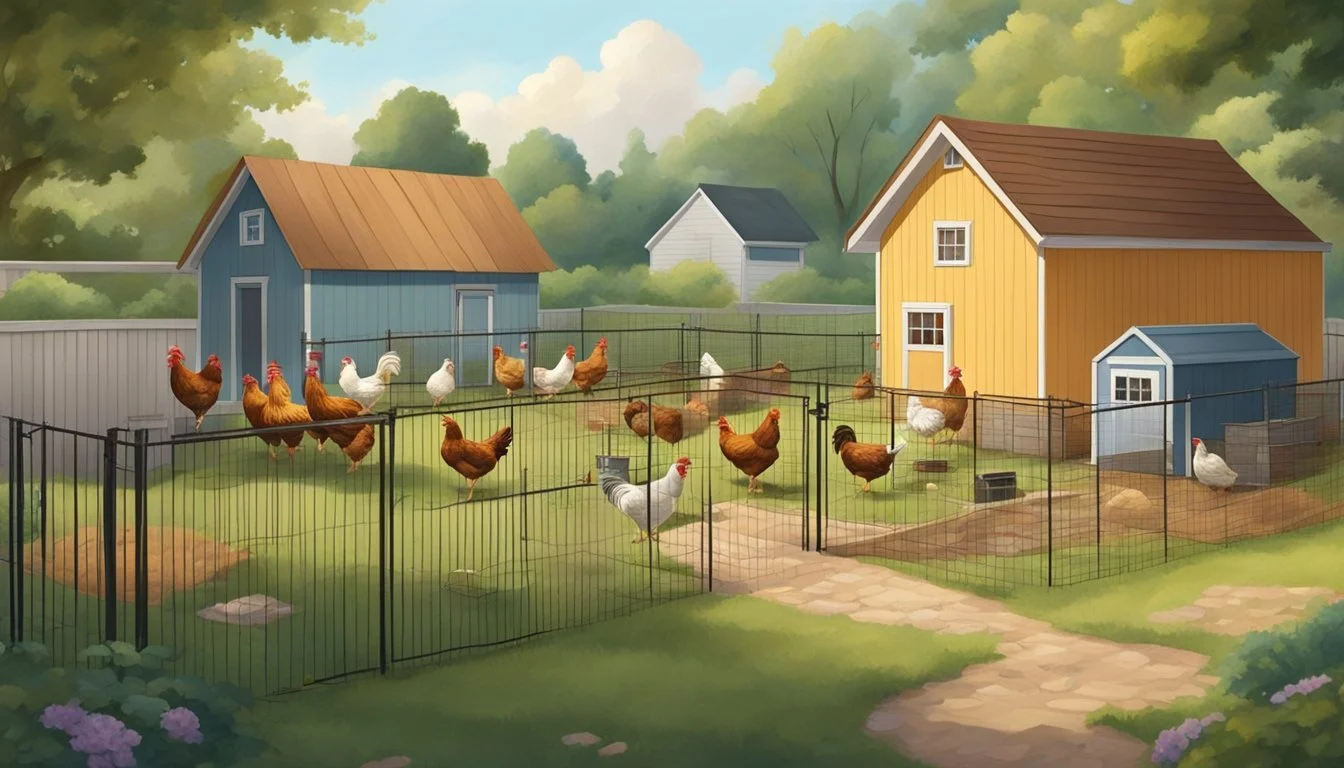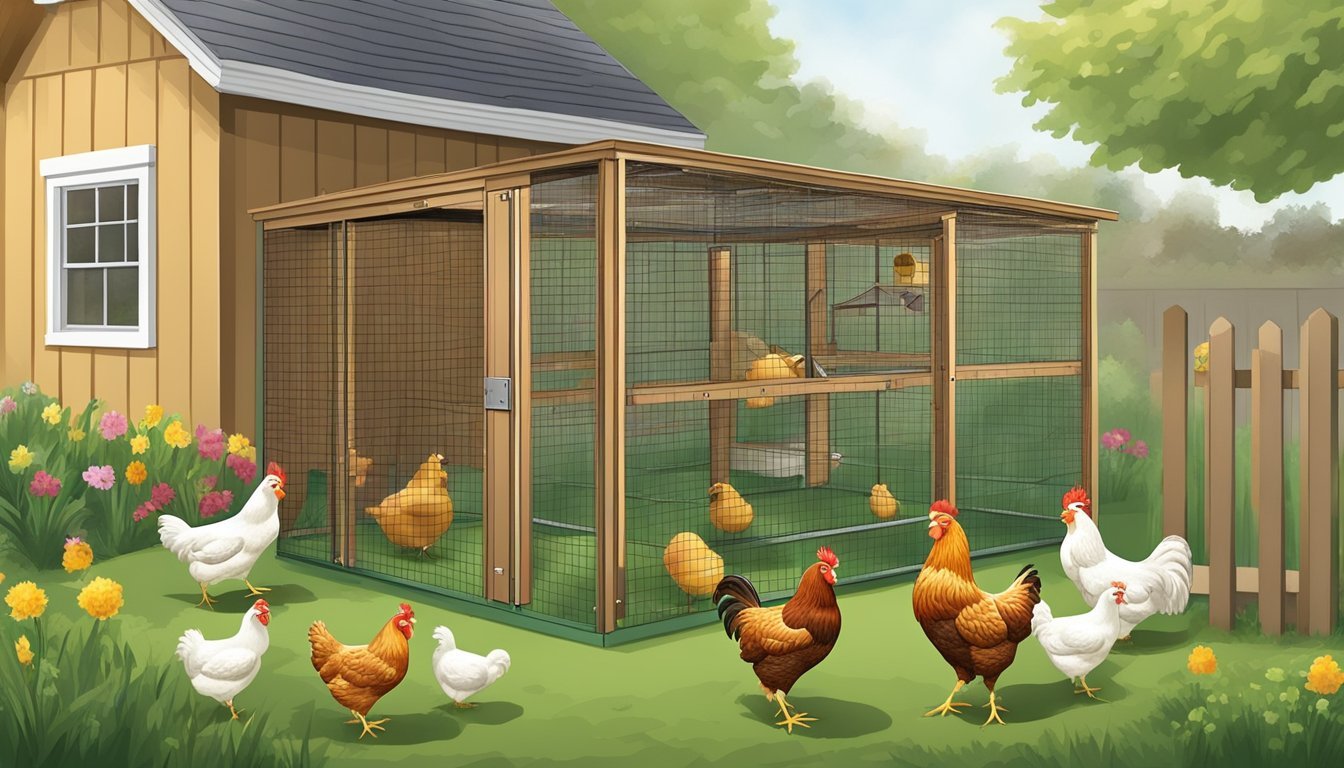Keeping Backyard Chickens in Paterson, NJ
Essential Guidelines for Urban Poultry Farming
In Paterson, New Jersey, the topic of keeping backyard chickens is subject to strict regulation. Unlike other cities in the state that have embraced urban poultry farming, Paterson prohibits the keeping of chickens within city limits. This stands in stark contrast to places like Jersey City, where residents can maintain a flock of up to fifty chickens, making it clear that local ordinances can vary significantly even within the same state.
The reasons behind these regulations are multifaceted, often rooted in concerns about noise, smell, and the potential for attracting predators or pests. For those interested in raising chickens, it is crucial to understand the specific municipal codes that govern the activity. Residents of Paterson who wish to pursue backyard chicken keeping would need to look into these regulations and lobby for change to allow for urban poultry within the city. It highlights the importance of being informed and engaged with local zoning laws before investing in coops, chickens, or any related equipment.
Legal Considerations for Keeping Chickens in Paterson
Residents of Paterson, New Jersey must navigate specific local ordinances and regulations to legally keep chickens. It's crucial to understand zoning laws, secure necessary permits and licenses, and adhere to health and sanitary regulations.
Understanding Zoning Laws
In Paterson, zoning laws strictly regulate the keeping of live chickens. Only business establishments that sell live fowl to the public are permitted to keep chickens, and even then, roosters are prohibited. Those interested in keeping chickens must consult the Paterson zoning ordinances to ensure their property is appropriately zoned for this purpose and does not violate local regulations.
Securing Necessary Permits and Licenses
A license issued by the Health Division is required for those who wish to keep any live fowl within the city limits, excluding the business establishments allowed to sell live poultry. Residents must apply for and obtain this permit before they bring any chickens onto their property, in compliance with the municipality's requirements.
Compliance with Local Health and Sanitary Regulations
The city imposes health and sanitary regulations to protect both the chickens and the community. Potential owners must follow best practices for coop construction, waste management, and overall maintenance to comply with local standards. These regulations are in place to prevent nuisances and ensure that the keeping of chickens does not pose any risks to public health or safety.
Setting Up Your Chicken Coop
When setting up a chicken coop in Paterson, NJ, one must carefully consider location, design, protection, and weather-proofing to ensure a safe and comfortable environment for the chickens.
Choosing the Right Location
The coop should be placed on high ground to avoid flooding, with sufficient distance from the property line to comply with local zoning regulations. It should provide easy access for cleaning and egg collection while avoiding exposure to excessive noise and pollution.
Design and Size of the Coop
A well-designed chicken coop offers plenty of space for each chicken and includes essential features like nesting boxes for egg-laying and ventilation for air circulation. The rule of thumb is to allow 2-3 square feet per chicken inside the coop and 8-10 square feet per chicken in an outdoor run.
Protecting from Predators and Pests
The coop must be secured with locks to deter predators such as raccoons, foxes, hawks, and possums. Use hardware cloth instead of chicken wire for enclosures, and ensure all potential entry points are sealed to prevent pests and predators from gaining access.
Weather Considerations and Insulation
In winter, chicken coops require insulation to keep the birds warm. However, proper ventilation is vital to avoid moisture build-up, which can lead to respiratory issues in chickens. The coop should provide shelter from the elements, including adequate roofing and walls that protect from wind and snow.
The chicken coop setup will significantly impact the health and productivity of your flock, and adherence to these measures will help in creating an optimal living space for your backyard chickens.
Chicken Health and Maintenance
Maintaining the health of backyard chickens in Paterson, NJ, hinges on proper feeding, cleanliness, and disease prevention. Owners should ensure that their chickens have access to balanced nutrition, clean living conditions, and routine healthcare to thrive.
Feeding and Nutrition
Chickens require a balanced diet to maintain good health. A typical diet consists of layers' pellets which provide a balanced mix of proteins, vitamins, and minerals.
Protein: Essential for growth and egg production. Sources include chicken feed and mealworms.
Grit: Helps with digestion.
Calcium: Important for strong eggshells, often supplied in the form of oyster shells.
Fresh water must be available at all times to aid in digestion and regulate body temperature.
Cleanliness and Waste Management
Keeping the coop clean is crucial to prevent the spread of bacteria and disease. A regular cleaning schedule should include:
Removing droppings daily.
Changing bedding regularly to keep the environment dry and ammonia levels low.
Proper waste disposal is essential to maintain a hygienic space for chickens and to minimize odors and attractants for pests.
Disease Prevention and Healthcare
Regular monitoring of chicken health can prevent the spread of disease. Key practices include:
Vaccinations and routine check-ups with a veterinarian.
Inspection for signs of illness or injury.
Preventative measures against mites, lice, and other parasites are critical. Clean, fresh water is vital for hydration and overall health, and water containers should be cleaned regularly to prevent algae growth and bacterial contamination.
By adhering to these specific care requirements, backyard chicken owners in Paterson can ensure their flock remains healthy and productive.
Understanding Chicken Behavior
Understanding chicken behavior is crucial for anyone considering raising backyard chickens in urban areas such as Paterson, NJ. Recognizing patterns in social dynamics, space requirements, and interactions with other animals can lead to a harmonious backyard flock.
Social Structure and Roosters
Chickens naturally establish a social hierarchy known as the "pecking order." This system dictates access to resources like food and nesting spaces. Hens typically follow a matriarchal leader, while roosters play a protective role. They often act as the flock's guardian against potential threats and facilitate breeding. A backyard setting in Paterson may only allow for a single rooster to prevent conflict and reduce noise.
Space and Exercise Needs
Backyard chickens are active and need adequate space to roam, forage, and express natural behaviors like dust bathing. They require a minimum of 10 square feet of outdoor space per chicken to prevent stress and aggression. Providing a run area where chickens can exercise and explore is essential for their well-being. Encouraging them to engage in activities like scratching and pecking at the ground mimics their natural environment.
Interaction with Other Animals
Introducing backyard chickens to a household with other animals, such as a dog, requires careful supervision and acclimatization. Chickens and dogs can coexist peacefully with proper training and boundaries. It's important to recognize that chickens are prey animals; therefore, Paterson residents need to ensure the safety of their flock from potential predators, even in an urban setting. Secure housing and controlled interaction can minimize risks and promote a tranquil environment for all animals involved.
The Impact of Chickens on Your Property and Neighborhood
Keeping backyard chickens in Paterson, NJ, entails considering their effects on your property and surrounding community. This section will cover managing noise and odor, maintaining good neighbor relations, and understanding chickens' influence on property value.
Managing Noise and Odor
Chickens are relatively low-noise pets, but roosters can cause noise disruptions, especially in the early morning. Paterson City regulations may restrict keeping roosters to minimize noise complaints. Regular cleaning of coops and proper waste management are essential to control odors that can affect both your property and your neighbors' comfort.
Noise:
Avoid roosters if possible.
Establish quiet hours for chicken activities.
Odor:
Clean coops frequently.
Compost chicken waste properly.
Good Practices for Neighbor Relations
Maintaining a cordial relationship with neighbors is crucial when raising backyard chickens. Transparent communication about your chicken-keeping practices can prevent misunderstandings. It's important to keep chickens confined to your property to prevent them from roaming into neighboring gardens or yards, which might cause damage or disputes.
Communication:
Inform neighbors of your chicken-keeping.
Address any concerns promptly.
Confinement:
Secure fencing around your property.
Ensure chickens have enough space to prevent escape.
Chickens and Property Value
The presence of a backyard chicken coop does not inherently decrease property value. In fact, it can be an attractive feature for potential buyers interested in sustainability and local food sourcing. However, it is important that the coop is well-maintained and the chickens are well-managed to ensure they add to the property's appeal rather than detracting from it.
Attractiveness:
Highlight the benefits of fresh eggs.
Showcase a well-kept garden and coop.
Maintenance:
Invest in an attractive and functional chicken coop.
Keep the coop and surrounding area clean and orderly.
Navigating the Market: Buying and Selling Chickens
When entering the world of backyard poultry in Paterson, NJ, one needs a clear understanding of how to select the right breeds and complete purchases effectively, as well as knowing the local regulations that govern the selling of chickens and eggs.
Selecting Breeds and Purchasing Chicks
In Paterson, a variety of breeds are available for purchase, each suited to different needs and preferences. Chickens like the Rhode Island Red or Plymouth Rock are prized for their robust egg-laying capabilities, which can provide a steady supply of fresh eggs. Buyers should purchase chicks from reputable hatcheries or local farms to ensure health and safety standards.
Steps to Purchase Chicks:
Research chicken breeds suited to Paterson's climate and your egg production needs.
Identify local hatcheries or farms with positive reviews for healthy and ethically-raised chicks.
Verify the seller's adherence to safety protocols, such as vaccination and de-beaking, if necessary.
Complete the purchase, ensuring you have the necessary setup for rearing young chicks safely.
Regulations on Selling Chickens and Eggs
For those planning to sell chickens or eggs in Paterson, understanding the local regulations is critical. It is permitted for residents to sell eggs and chickens on a small scale, as long as it's for non-commercial purposes. However, sellers must comply with safety and handling standards to guarantee product quality.
Key Regulations for Selling:
Eggs must be collected frequently, cleaned, and stored properly to ensure freshness and prevent contamination.
As per local ordinances, chickens sold must be free from disease and in good health.
It is recommended to label egg cartons with the date of collection and a note if eggs are unwashed, as this preserves the natural protective coating.
Before selling eggs or poultry, producers in Paterson should check with the city's municipal code for any recent changes to backyard chicken laws. They should also have a system in place for managing transactions to ensure they stay within the scope of non-commercial sales.
Community and Legal Resources
This section provides valuable information on local entities and regulations that are essential for anyone interested in raising chickens in Paterson, NJ.
Local Organizations and Support Groups
In Paterson and the surrounding areas, individuals looking to raise backyard chickens can connect with local organizations for support. Groups such as Jersey City Chicken Keepers or the Camden County Poultry Enthusiasts often offer a wealth of information, ranging from best practices in raising chickens to navigating local ordinances. Support groups offer a platform for both seasoned and novice chicken keepers to share insights and collaborate.
Hudson County Henkeepers: A supportive group for residents keen on poultry rearing, providing resources and community engagement opportunities.
Gloucester Backyard Poultry Network: This network offers a space for residents from Gloucester and nearby cities like Woodbury or Cherry Hill to discuss chicken keeping.
Staying Informed About Changing Laws
Laws and ordinances related to the raising of chickens can evolve, hence it is critical to stay informed on current and pending legal requirements. Chicken Laws in New Jersey can vary widely depending on the municipality.
Paterson Regulations: Residents should closely follow local policies, which stipulate that permits are required for backyard chickens.
Municipality Permit Requirement Additional Notes Paterson, NJ Mandatory Check current regulations for updates Jersey City, NJ May vary Confirm with local health department Camden County Depends on specific township laws Consult with municipal offices
Research and Education: Prospective and existing backyard chicken keepers in Paterson are advised to periodically review the Paterson city website and consult with the Department of Health and Community Wellness for the latest guidance on chicken laws. Joining local online forums and attending city council meetings can also provide insights into potential changes in legalities concerning backyard chickens in Paterson and wider New Jersey.
Conclusion
Keeping backyard chickens is a practice that requires commitment and a clear understanding of local ordinances. Residents of Paterson, New Jersey, along with other suburban areas like Haddonfield, must navigate their specific city regulations to ensure that their endeavor into poultry-keeping is within the bounds of the law.
Chickens offer benefits beyond being merely livestock; they can become beloved pets, provide fresh eggs, and contribute to sustainable living practices. However, individuals must weigh these benefits against the responsibilities that come with raising any type of animal, such as providing proper care, maintaining cleanliness, and managing noise levels to avoid complaints from neighbors.
For those residents committed to the idea, it's crucial to:
Research: Stay informed about the latest ordinances in Paterson, NJ, to ensure compliance.
Prepare: Design and maintain an environment suitable for chickens that is both safe and hygienic.
Engage: Discuss plans with neighbors and community members to address concerns proactively.
By taking a considerate and informed approach, residents can enjoy the rewards that come with raising chickens in a suburban setting like Paterson, NJ. The key is to balance the joy of keeping chickens with the diligence required to do so responsibly.









